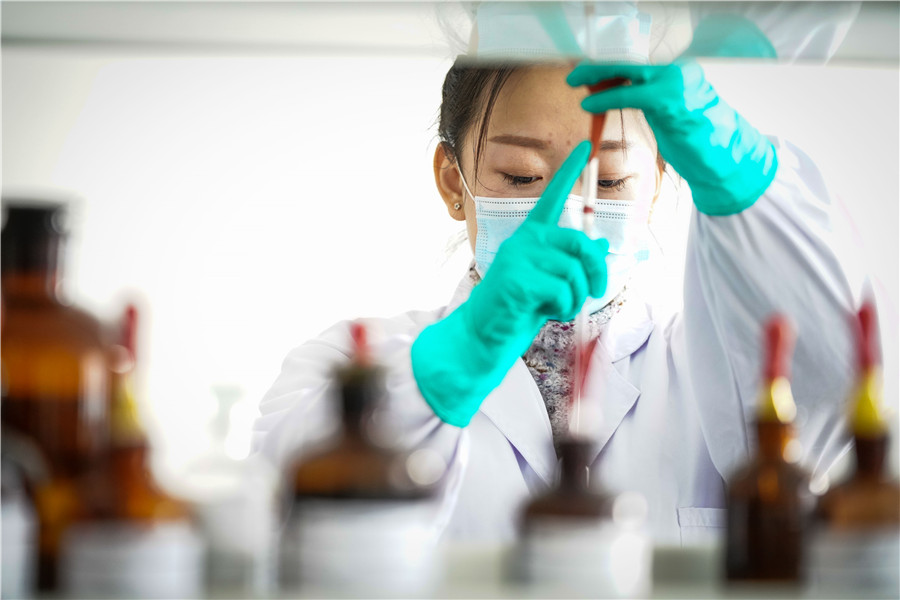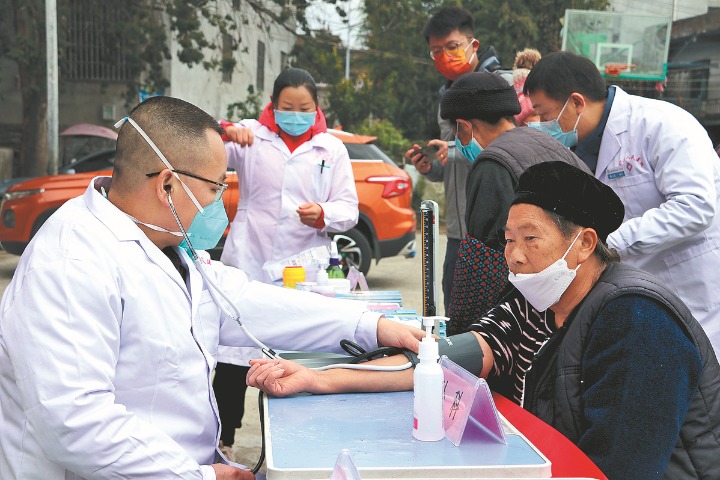Teamwork underway to develop vaccine

China, global partners join hands as experts urge swift, coordinated scientific cooperation
As COVID-19 spreads to more than 100 countries and the number of confirmed cases keeps rising outside of China, experts say swift and coordinated international scientific cooperation is essential in order to stem the epidemic.
Efforts to develop a vaccine are underway in China and in partnership with researchers from other countries, with work focusing on five main types of vaccine.
Wu Yuanbin, the head of the bureau of social development at the Ministry of Science and Technology, noted in a news briefing last week that the situation in China has improved, though the epidemic is gaining momentum in other countries.
As of Tuesday, 109 countries and regions outside China had reported confirmed cases of COVID-19, with more than 113,000 cases worldwide and over 4,000 deaths, according to the World Health Organization. The WHO had raised the risk assessment of novel coronavirus pneumonia, or COVID-19, from high to very high at the global level on Feb 28.
South Korea, Italy, Iran and Japan are among the worst-hit countries, and European nations such as France and Germany have resorted to blocking the export of medical supplies.
"The virus knows no borders, and since the outbreak began, it has become a global concern," Wu said. "As the epidemic is worsening in some countries, it is more important now than ever for the international community to strengthen scientific cooperation."
Based on the principles of openness and cooperation, China has maintained close contact and collaboration with international scientific communities and public health authorities since the outbreak began, Wu said.
On Jan 12, Chinese scientists published the full genetic sequence of the virus, laying the groundwork for basic global research. Nine days later, China released the primer and probe sequences that are essential in the nucleic acid test for the disease. This allows foreign countries to produce diagnostic kits domestically.
From Feb 15 to 23, the WHO-China joint mission on the coronavirus toured China to gain a firsthand look at the epidemic. It produced a report that offered more details about the clinical course of COVID-19 and the epidemiology in China.
"We are very willing to enhance our cooperation with the WHO and share our knowledge with other countries in developing drugs, vaccines and diagnosis methods," Wu said.
Zheng Zhongwei, director of the Development Center for Medical Science and Technology of the National Health Commission, said last week that China has nine ongoing research projects on vaccine development, and some will hopefully enter clinical trials in April.
The main types of vaccine that China is working on include inactivated, nucleic acid-based and vector vaccines.
Zheng said he does not know of any reports of foreign researchers working on an inactivated vaccine, which consists of virus particles that no longer have disease-producing capability.
The United States biotech company Inovio Pharmaceuticals and its partner Beijing Advaccine Biotechnology are developing a "DNA vaccine" called INO-4800. This nucleic acid-based vaccine is in preclinical trial and involves directly injecting genetic material into a person to trigger a strong immune response.
In January, US biotech company GeoVax partnered with Chinese vaccine developer BravoVax to develop a vector vaccine, which uses a weakened virus to transport pieces of the pathogen into the human body. This vaccine is also in pre-clinical trial.
As for drug development, Chinese scientists have expanded clinical trials for favipiravir, a Japanese antiviral drug that showed promise against the virus in clinical trials in Shenzhen, Guangdong province. The expanded trials would cover patients in Wuhan, said Sun Yanrong, deputy director of the China National Center for Biotechnology Development.
Tocilizumab, a drug that suppresses overreactions of the immune system, has recently been added to the treatment and diagnosis guideline of the National Health Commission, she added.
The Swiss-made anti-inflammation drug helps to inhibit a deadly medical condition called a cytokine storm-an overproduction of immune cells that damages healthy tissues-which is also one of the main causes of death for critically ill COVID-19 patients.
Last month, the Red Cross Society of China donated more than 30,000 injection solutions to help patients in Wuhan. Sun said around 270 severely ill patients were being treated with tocilizumab.
Cao Bin, the head of clinical trials for the antiviral medicine remdesivir in China, said last week that the experimental US drug had been administered to more than 230 severely ill patients, but their results would take time to collect and analyze.
Remdesivir, developed by US biotech company Gilead Sciences, is not currently approved for any indication globally, but clinical trials in China, the US and other countries with high numbers of diagnosed cases are being conducted to test its efficacy against COVID-19, the drug maker said.
Please feel free to contact us by sending your questions to question@chinadaily.com.cn or commenting on China Daily app. We will ask experts to answer them.














